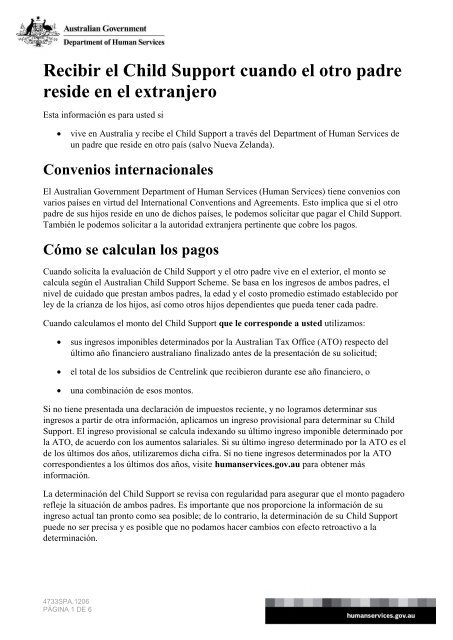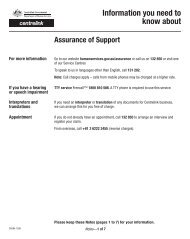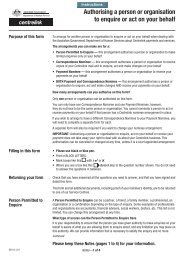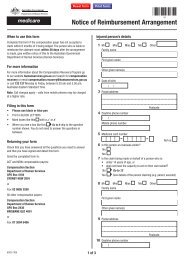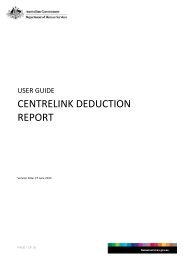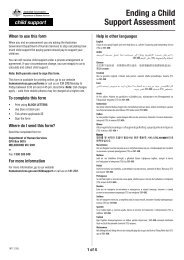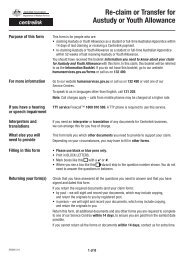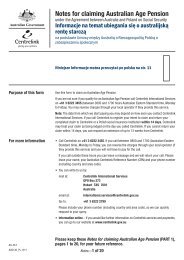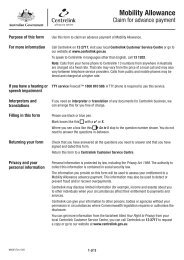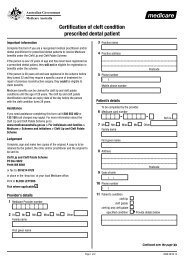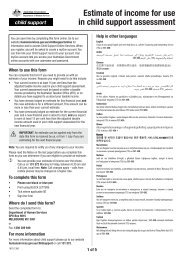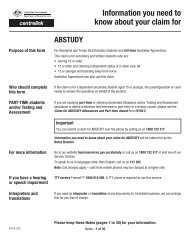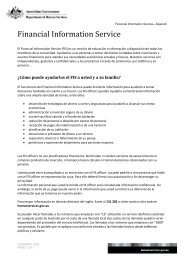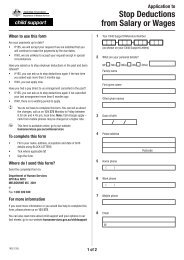Receiving Child Support when the other parent lives overseas ...
Receiving Child Support when the other parent lives overseas ...
Receiving Child Support when the other parent lives overseas ...
Create successful ePaper yourself
Turn your PDF publications into a flip-book with our unique Google optimized e-Paper software.
Recibir el <strong>Child</strong> <strong>Support</strong> cuando el otro padre<br />
reside en el extranjero<br />
Esta información es para usted si<br />
vive en Australia y recibe el <strong>Child</strong> <strong>Support</strong> a través del Department of Human Services de<br />
un padre que reside en otro país (salvo Nueva Zelanda).<br />
Convenios internacionales<br />
El Australian Government Department of Human Services (Human Services) tiene convenios con<br />
varios países en virtud del International Conventions and Agreements. Esto implica que si el otro<br />
padre de sus hijos reside en uno de dichos países, le podemos solicitar que pagar el <strong>Child</strong> <strong>Support</strong>.<br />
También le podemos solicitar a la autoridad extranjera pertinente que cobre los pagos.<br />
Cómo se calculan los pagos<br />
Cuando solicita la evaluación de <strong>Child</strong> <strong>Support</strong> y el otro padre vive en el exterior, el monto se<br />
calcula según el Australian <strong>Child</strong> <strong>Support</strong> Scheme. Se basa en los ingresos de ambos padres, el<br />
nivel de cuidado que prestan ambos padres, la edad y el costo promedio estimado establecido por<br />
ley de la crianza de los hijos, así como otros hijos dependientes que pueda tener cada padre.<br />
Cuando calculamos el monto del <strong>Child</strong> <strong>Support</strong> que le corresponde a usted utilizamos:<br />
sus ingresos imponibles determinados por la Australian Tax Office (ATO) respecto del<br />
último año financiero australiano finalizado antes de la presentación de su solicitud;<br />
el total de los subsidios de Centrelink que recibieron durante ese año financiero, o<br />
una combinación de esos montos.<br />
Si no tiene presentada una declaración de impuestos reciente, y no logramos determinar sus<br />
ingresos a partir de otra información, aplicamos un ingreso provisional para determinar su <strong>Child</strong><br />
<strong>Support</strong>. El ingreso provisional se calcula indexando su último ingreso imponible determinado por<br />
la ATO, de acuerdo con los aumentos salariales. Si su último ingreso determinado por la ATO es el<br />
de los últimos dos años, utilizaremos dicha cifra. Si no tiene ingresos determinados por la ATO<br />
correspondientes a los últimos dos años, visite humanservices.gov.au para obtener más<br />
información.<br />
La determinación del <strong>Child</strong> <strong>Support</strong> se revisa con regularidad para asegurar que el monto pagadero<br />
refleje la situación de ambos padres. Es importante que nos proporcione la información de su<br />
ingreso actual tan pronto como sea posible; de lo contrario, la determinación de su <strong>Child</strong> <strong>Support</strong><br />
puede no ser precisa y es posible que no podamos hacer cambios con efecto retroactivo a la<br />
determinación.<br />
4733SPA.1206<br />
PÁGINA 1 DE 6
Cuando calculamos el monto de <strong>Child</strong> <strong>Support</strong> para el padre que está en el extranjero utilizamos:<br />
sus ingresos del último año financiero finalizado en el país donde se encuentra. Se necesita<br />
tener prueba documental del ingreso y conocer las necesidades a cubrir según su divisa<br />
extranjera. Esto se convierte a dólares australianos aplicando el promedio del índice de<br />
International Money Transfer usado por el Commonwealth Bank Australia, correspondiente<br />
al año financiero del país extranjero.<br />
Si no podemos comunicarnos con el padre que está en el extranjero para obtener esta información, o<br />
si el padre mismo no nos brinda dicha información, podremos solicitarles los datos a las autoridades<br />
pertinentes de ese país. Sin embargo, las normas de privacidad a menudo impiden que estas<br />
autoridades nos brinden esa información.<br />
Si no contamos con dichos datos de ingresos, utilizamos la información que tenemos sobre los<br />
ingresos que percibe el padre para determinar un ingreso provisional. El ingreso provisional:<br />
se basa en el promedio Male Total Average Weekly Earnings (MTAWE) de Australia o<br />
en una cifra de $0 en ciertas circunstancias.<br />
Para obtener más información sobre los ingresos provisionales o MTAWE, visite<br />
humanservices.gov.au.<br />
Pagos privados<br />
Si usted está registrado ante nosotros, puede elegir esta opción cuando:<br />
se haya emitido una determinación de <strong>Child</strong> <strong>Support</strong> o<br />
nosotros hayamos aceptado un acuerdo de <strong>Child</strong> <strong>Support</strong>.<br />
Le diremos el monto de <strong>Child</strong> <strong>Support</strong> que debe pagar. Si usted y el otro padre pueden calcular los<br />
acuerdos de pago que mejor se adecuen a usted y a los niños, los pagos se pueden realizar de<br />
manera privada. Visite humanservices.gov.au para obtener más información.<br />
Inscríbase ahora en los <strong>Child</strong> <strong>Support</strong> Online Services<br />
Los <strong>Child</strong> <strong>Support</strong> Online Services (actualmente llamados CSAonline) constituyen un modo rápido,<br />
sencillo y seguro de gestionar su <strong>Child</strong> <strong>Support</strong> en el momento y en el lugar que le convenga.<br />
Inscríbase ahora para ver y actualizar sus datos personales y enviarnos mensajes seguros<br />
(incluyendo archivos adjuntos). Visite humanservices.gov.au/csaoline para saber más.<br />
Qué puede hacer si no está de acuerdo<br />
Llámenos al 131 272* si no está de acuerdo con el monto determinado. Conversaremos sobre los<br />
detalles de su caso para asegurarle que la información utilizada sea correcta. Si no está de acuerdo<br />
con nuestra decisión, tiene derecho a que sea reconsiderada. Llámenos para hablar sobre las<br />
opciones a su alcance y le explicaremos cómo es el proceso para objetarla.<br />
RECEIVING CHILD SUPPORT WHEN THE OTHER PARENT LIVES OVERSEAS<br />
4733SPA.1206<br />
PÁGINA 2 DE 6 Department of Human Services
Si cree que la determinación de su <strong>Child</strong> <strong>Support</strong> no refleja su situación especial, la de sus hijos o la<br />
del otro padre, puede solicitar un cambio en la determinación. Su situación debe estar comprendida<br />
dentro de una cantidad de motivos para solicitar un cambio. El hecho de estar simplemente<br />
desconforme con su determinación no es un motivo para solicitarlo.<br />
Visite humanservices.gov.au/reviewsandappeals para obtener más información sobre objeciones<br />
y el proceso de cambio de la determinación.<br />
Designación de representante<br />
Puede designar a otra persona u organización para que trabaje con nosotros en su nombre. Su<br />
representante podrá hacer consultas y brindar información en su nombre, pero no firmar<br />
documentos ni negociar por usted. Para designar a un representante, complete el formulario<br />
Representative Authority que se encuentra en humanservices.gov.au y envíenoslo por fax o de otro<br />
modo.<br />
Cómo cobramos los pagos<br />
Cuando registremos su caso, trataremos de ponernos en contacto con el otro padre si tenemos sus<br />
datos de contacto. Cuando nos pongamos en contacto, le solicitaremos que pague de manera<br />
voluntaria, dado que esta es la manera más efectiva de cobrar los pagos. Generalmente, les damos<br />
hasta tres meses para que los hagan.<br />
Si pagan de manera voluntaria, le enviaremos el monto a usted en dólares australianos mediante su<br />
cuenta bancaria en Australia, o por cheque si no tiene cuenta bancaria. Solo se le enviará el dinero<br />
pagado por el otro padre. No podemos pagar el <strong>Child</strong> <strong>Support</strong> por adelantado.<br />
Los pagos del <strong>Child</strong> <strong>Support</strong> son desembolsados una vez por mes. Para obtener más información<br />
sobre sus pagos, llame al 131 107. Este servicio automatizado le proporcionará información sobre<br />
su caso de <strong>Child</strong> <strong>Support</strong> tal como datos sobre su próximo pago y su último pago.<br />
Qué podemos hacer si el padre que vive en el extranjero<br />
no paga<br />
Si el otro padre se rehúsa a pagar o no cumple con sus compromisos, verificaremos si el caso se<br />
puede derivar a la autoridad pertinente en el extranjero para su posible ejecución. Le notificaremos<br />
si es posible derivar su caso.<br />
No derivamos todos los casos para su cumplimiento en el extranjero aun cuando tengamos<br />
convenios con esos países. Esto se debe a que algunos países:<br />
no pueden reconocer las determinaciones a menos que estén disponibles los datos de la<br />
dirección del padre;<br />
no pueden reconocer las determinaciones administrativas;<br />
RECEIVING CHILD SUPPORT WHEN THE OTHER PARENT LIVES OVERSEAS<br />
4733SPA.1206<br />
PÁGINA 3 DE 6 Department of Human Services
carecen de infraestructura para cobrar el <strong>Child</strong> <strong>Support</strong> de manera efectiva en nuestro<br />
nombre;<br />
no pueden ejercer las mismas facultades de cumplimiento que nosotros sí podemos ejercer.<br />
Si no podemos transferir el caso, continuaremos tratando de negociar los pagos voluntarios con el<br />
padre que vive en el extranjero. Si esto no resulta satisfactorio, podemos decidir no proseguir con<br />
otras acciones a menos que las situaciones cambien y se disponga de nueva información. Nos<br />
pondremos en contacto con usted para solicitarle cualquier tipo de información nueva que pudiera<br />
ayudarnos a cobrar el dinero. También le informaremos por escrito cualquier decisión que<br />
tomemos.<br />
Si transferimos su caso al extranjero<br />
Se le solicitará que complete un cuestionario de transferencia si el caso se debe transferir al<br />
extranjero. También le solicitaremos que complete:<br />
un formulario de power of attorney: algunos países solicitan este formulario que les otorgar<br />
facultades para actuar en su nombre. Si usted no está de acuerdo en firmarlo, es posible que<br />
no podamos transferir su caso al extranjero si el país donde vive el padre que aporta necesita<br />
esos documentos (esto incluye la mayoría de los países europeos);<br />
un formulario de statement of mean: a veces se necesita dicho formulario para presentarlo en<br />
tribunales. Le brinda a los tribunales una comprensión detallada de su situación financiera.<br />
También le solicitamos que complete otros formularios dependiendo de su situación y de los<br />
requisitos del otro país donde vive el padre que aporta. Le proporcionaremos información sobre<br />
estos formularios y cómo completarlos. Si no puede o no quiere completar estos formularios, en la<br />
mayoría de los casos no podremos hacer nada más para cobrar el <strong>Child</strong> <strong>Support</strong> a menos que el padre<br />
pague de forma voluntaria.<br />
Cobro de pagos en el extranjero<br />
Después de que su caso se envía al extranjero, la autoridad pertinente considera la solicitud y se<br />
pone en contacto con nosotros si aún se necesitan más datos. Si es necesario, nos pondremos en<br />
contacto con usted. Una vez que se envíen todos los documentos, por lo general, su caso se enviará<br />
al tribunal para su consideración. Los tribunales en el extranjero pueden:<br />
reconocer y tratar de hacer cumplir nuestra determinación sin cambios;<br />
cambiar la determinación mediante una Court Order si es necesario en dicho país, con<br />
montos probablemente distintos (según la situación del padre que aporta) y reducir o pagar<br />
los montos adeudados;<br />
rehusarse a reconocer o hacer cumplir la deuda debido a asuntos jurisdiccionales o porque el<br />
padre que aporta no puede pagar el monto de manutención de menores.<br />
RECEIVING CHILD SUPPORT WHEN THE OTHER PARENT LIVES OVERSEAS<br />
4733SPA.1206<br />
PÁGINA 4 DE 6 Department of Human Services
Estos asuntos son habitualmente tratados en los tribunales, por lo tanto los períodos pueden ser<br />
extensos y variar de manera significativa en cada país. El cobro de los pagos puede llevar entre 12 y<br />
18 meses, y aún más si hay asuntos en disputa.<br />
Nuestra función una vez que el caso se haya transferido<br />
Después de que su caso se haya enviado al extranjero, nuestra función es la de apoyar el proceso de<br />
transferencia de pagos. Nosotros:<br />
le daremos a la autoridad extranjera información sobre cómo se calculó su determinación y<br />
los montos pagaderos;<br />
le daremos a la autoridad extranjera información sobre los cambios a su determinación si<br />
ellos necesitan dicha información;<br />
le solicitaremos a la autoridad extranjera una actualización sobre el estado de su caso,<br />
dándole por lo menos tres meses entre la actualización solicitada para permitirle cotejar con<br />
alguna correspondencia anterior;<br />
registraremos el monto del <strong>Child</strong> <strong>Support</strong> que usted tiene derecho a recibir en Australia;<br />
enviaremos a la autoridad extranjera cualquier documento que pueda ser necesario<br />
considerar, así como también sus respuestas.<br />
No podemos:<br />
actuar como defensor suyo en procesos en el extranjero;<br />
escribir presentaciones en su nombre para los tribunales o autoridades en el extranjero;<br />
comparecer en su nombre en procesos judiciales en el extranjero;<br />
presentar apelaciones en su nombre en procesos judiciales en el extranjero.<br />
¿Cambió algo?<br />
Mantenga actualizados sus datos avisándonos tan pronto como sea posible si cambia su situación.<br />
Recursos de apoyo<br />
Contamos con una variedad de publicaciones y de productos para ayudarle a comprender el <strong>Child</strong><br />
<strong>Support</strong> Scheme y para asistirlos a usted y a sus hijos tras la separación familiar. Pueden obtenerse<br />
sin cargo en humanservices.gov.au/order o llamando al 1800 040 972*.<br />
Servicios de apoyo<br />
Existen servicios de apoyo para ayudar a las familias afectadas por temas de relación o de<br />
separación, como la Family Relationship Advice Line.<br />
RECEIVING CHILD SUPPORT WHEN THE OTHER PARENT LIVES OVERSEAS<br />
4733SPA.1206<br />
PÁGINA 5 DE 6 Department of Human Services
La Advice Line proporciona información y asesoramiento sobre temas de relaciones familiares y<br />
puede darle información sobre otros servicios útiles en su zona. Llame al 1800 050 321 de lunes a<br />
viernes de 8 a 20 y los sábados de 10 a 16 (hora local, excepto feriados) o visite<br />
familyrelationships.gov.au.<br />
Su privacidad<br />
Recopilamos información sobre usted y su familia para los fines de <strong>Child</strong> <strong>Support</strong>. Entendemos que<br />
cierta información es sensible y atribuimos suma importancia a la protección de su privacidad. Para<br />
obtener más información, visite humanservices.gov.au/privacy.<br />
Póngase en contacto con nosotros<br />
Si usted tiene una cuenta con <strong>Child</strong> <strong>Support</strong> Online Services, puede enviarnos un mensaje<br />
seguro con archivos adjuntos. Visite humanservices.gov.au/csaonline<br />
Visite nuestro sitio web humanservices.gov.au/contact<br />
Llámenos al 131 272* † durante el horario comercial (de lunes a viernes de 8.30 a 16.45).<br />
*La llamada puede estar sujeta a cargos.<br />
† Tenga en cuenta que la llamada puede ser grabada.<br />
¿Necesita la ayuda de un intérprete?<br />
Si no habla inglés y necesita ayuda, llame al Telephone Interpreting Service al 131 450.<br />
RECEIVING CHILD SUPPORT WHEN THE OTHER PARENT LIVES OVERSEAS<br />
4733SPA.1206<br />
PÁGINA 6 DE 6 Department of Human Services
<strong>Receiving</strong> <strong>Child</strong> <strong>Support</strong> <strong>when</strong> <strong>the</strong> o<strong>the</strong>r<br />
<strong>parent</strong> <strong>lives</strong> <strong>overseas</strong><br />
This information is for you if :<br />
4733.1206<br />
PAGE 1 OF 6<br />
you live in Australia and receive <strong>Child</strong> <strong>Support</strong> via <strong>the</strong> Department of Human Services from a <strong>parent</strong><br />
who <strong>lives</strong> <strong>overseas</strong> (excluding New Zealand).<br />
International arrangements<br />
The Australian Government Department of Human Services (Human Services) has arrangements with a<br />
number of countries under International Conventions and Agreements. This means if <strong>the</strong> o<strong>the</strong>r <strong>parent</strong> of your<br />
children <strong>lives</strong> in one of <strong>the</strong>se countries, we can ask <strong>the</strong>m to pay <strong>Child</strong> <strong>Support</strong>. We may also ask <strong>the</strong> relevant<br />
<strong>overseas</strong> authority to collect payments.<br />
How payments are worked out<br />
When you apply for a <strong>Child</strong> <strong>Support</strong> assessment and <strong>the</strong> o<strong>the</strong>r <strong>parent</strong> <strong>lives</strong> <strong>overseas</strong>, <strong>the</strong> amount is worked<br />
out under <strong>the</strong> Australian <strong>Child</strong> <strong>Support</strong> Scheme. It’s based on both <strong>parent</strong>s’ income and level of care, <strong>the</strong> age<br />
and statutory estimated average cost of raising children, and any o<strong>the</strong>r dependent children each <strong>parent</strong> may<br />
have.<br />
When we calculate <strong>the</strong> <strong>Child</strong> <strong>Support</strong> amount for you we use:<br />
your taxable income as assessed by <strong>the</strong> Australian Tax Office (ATO) for <strong>the</strong> most recently ended<br />
Australian financial year before your application was lodged<br />
<strong>the</strong> total Centrelink benefits you received in that financial year, or<br />
a combination of <strong>the</strong>se amounts.<br />
If you haven’t lodged a recent tax return, and we can’t work out your income from o<strong>the</strong>r information, we use<br />
a provisional income to assess your <strong>Child</strong> <strong>Support</strong>. The provisional income is worked out by indexing your<br />
most recent taxable income assessed by <strong>the</strong> ATO, in line with wages growth. If your most recent ATO<br />
assessed income is from <strong>the</strong> last two years, we’ll use this figure. If you don’t have an ATO issued income<br />
from <strong>the</strong> last two years, visit humanservices.gov.au for more information.<br />
<strong>Child</strong> <strong>Support</strong> assessments are reviewed regularly to ensure <strong>the</strong> amount payable reflects <strong>the</strong> circumstances of<br />
both <strong>parent</strong>s. It’s important that you provide us with your current income information as soon as possible,<br />
o<strong>the</strong>rwise your <strong>Child</strong> <strong>Support</strong> assessment may not be accurate and we may not be able to backdate any<br />
changes to <strong>the</strong> assessment.
When we calculate <strong>the</strong> <strong>Child</strong> <strong>Support</strong> amount for <strong>the</strong> <strong>parent</strong> <strong>overseas</strong> we use:<br />
4733.1206<br />
<strong>the</strong>ir income from <strong>the</strong> most recently ended financial year in <strong>the</strong>ir country. Documentary evidence of<br />
<strong>the</strong> amount is necessary and needs to be provided in <strong>the</strong>ir foreign currency. This is converted into<br />
Australian dollars using <strong>the</strong> average of <strong>the</strong> International Money Transfer rate used by <strong>the</strong><br />
Commonwealth Bank Australia, for <strong>the</strong> period of <strong>the</strong> foreign country’s financial year.<br />
If we’re unable to contact <strong>the</strong> <strong>parent</strong> <strong>overseas</strong> to get this information, or <strong>the</strong> <strong>parent</strong> doesn’t supply it to us<br />
<strong>the</strong>mselves, we may ask <strong>the</strong> relevant authorities in <strong>the</strong>ir country for <strong>the</strong> details. However, privacy rules often<br />
mean <strong>the</strong>se authorities are unable to give us this information.<br />
If <strong>the</strong>se income details aren’t available, we use <strong>the</strong> information we have about <strong>the</strong> <strong>parent</strong>’s income to work<br />
out a provisional income. The provisional income is:<br />
based on <strong>the</strong> Male Total Average Weekly Earnings (MTAWE) in Australia or<br />
a figure of $0 in certain circumstances.<br />
For more information about provisional incomes or MTAWE visit humanservices.gov.au.<br />
Private payments<br />
If you’ve registered with us, you can choose this option <strong>when</strong>:<br />
a <strong>Child</strong> <strong>Support</strong> assessment has been issued or<br />
a <strong>Child</strong> <strong>Support</strong> agreement is accepted by us.<br />
We’ll tell you how much <strong>Child</strong> <strong>Support</strong> needs to be paid. If you and <strong>the</strong> o<strong>the</strong>r <strong>parent</strong> can work out <strong>the</strong><br />
payment arrangements that best suit you and <strong>the</strong> children, <strong>the</strong>n payments are made privately. Visit<br />
humanservices.gov.au for more information.<br />
Enrol now for <strong>Child</strong> <strong>Support</strong> Online Services<br />
<strong>Child</strong> <strong>Support</strong> Online Services (currently known as CSAonline) is a quick, easy and secure way to do your<br />
<strong>Child</strong> <strong>Support</strong> business where and <strong>when</strong> it suits you. Enrol now to view and update your personal details and<br />
send us secure messages (including attachments). Visit humanservices.gov.au/csaoline to learn more.<br />
What you can do if you don’t agree<br />
Call us on 131 272* if don’t agree with <strong>the</strong> assessment amount. We’ll discuss <strong>the</strong> details of your case to<br />
make sure <strong>the</strong> information we used is correct. If you don’t agree with our decision, you may have <strong>the</strong> right to<br />
have it reconsidered. Call us to talk about <strong>the</strong> options available to you, and we’ll explain <strong>the</strong> objections<br />
process.<br />
RECEIVING CHILD SUPPORT WHEN THE OTHER PARENT LIVES OVERSEAS<br />
PAGE 2 OF 6 Department of Human Services
If you believe your <strong>Child</strong> <strong>Support</strong> assessment doesn’t reflect your special circumstances, your children’s or<br />
<strong>the</strong> o<strong>the</strong>r <strong>parent</strong>’s, you may be able to apply for a change of assessment. Your circumstances must fall within<br />
one of a number of reasons to seek a change. Just being unhappy with your assessment is not a reason to<br />
apply.<br />
Go to humanservices.gov.au/reviewsandappeals for more information about objections and <strong>the</strong> change of<br />
assessment process.<br />
Nominating a representative<br />
You can nominate ano<strong>the</strong>r person or organisation to work with us on your behalf. Your representative will be<br />
able to make enquiries and provide information on your behalf, but <strong>the</strong>y won’t be able to sign documents and<br />
negotiate for you. To nominate a representative, fill out <strong>the</strong> Representative Authority form available at<br />
humanservices.gov.au and send or fax it to us.<br />
How we collect payments<br />
When we register your case, we’ll try to contact <strong>the</strong> o<strong>the</strong>r <strong>parent</strong> if we have <strong>the</strong>ir contact details. Once we<br />
make contact, we’ll ask <strong>the</strong>m to pay voluntarily, as this is <strong>the</strong> most effective way to collect payments. We<br />
usually allow up to three months for <strong>the</strong>m to do this.<br />
If <strong>the</strong>y pay voluntarily we’ll send <strong>the</strong> amount to you in Australian dollars via your Australian bank account,<br />
or by cheque if you don’t have a bank account. Only money collected from <strong>the</strong> o<strong>the</strong>r <strong>parent</strong> will be sent to<br />
you. We can’t pay <strong>Child</strong> <strong>Support</strong> in advance.<br />
<strong>Child</strong> <strong>Support</strong> payments are disbursed once a month. For more information about your payments,<br />
call 131 107. This automated service will provide information about your <strong>Child</strong> <strong>Support</strong> case such as details<br />
about your next payment and your last payment.<br />
What we can do if <strong>the</strong> <strong>parent</strong> <strong>overseas</strong> doesn’t pay<br />
If <strong>the</strong> o<strong>the</strong>r <strong>parent</strong> refuses to pay or fails to meet <strong>the</strong>ir commitments, we’ll check whe<strong>the</strong>r <strong>the</strong> case can be<br />
referred to <strong>the</strong> relevant <strong>overseas</strong> authority for possible enforcement. We’ll let you know if your case can be<br />
referred.<br />
We don’t refer every case for enforcement <strong>overseas</strong> even if we have arrangements with <strong>the</strong>se countries. This<br />
is because some countries:<br />
4733.1206<br />
can’t recognise assessments unless <strong>the</strong> <strong>parent</strong>’s address details are available<br />
can’t recognise administrative assessments<br />
lack <strong>the</strong> infrastructure to effectively collect <strong>Child</strong> <strong>Support</strong> on our behalf<br />
can’t exercise <strong>the</strong> same level of enforcement powers available to us.<br />
RECEIVING CHILD SUPPORT WHEN THE OTHER PARENT LIVES OVERSEAS<br />
PAGE 3 OF 6 Department of Human Services
If we can’t transfer <strong>the</strong> case, we’ll continue to try to negotiate voluntary payments with <strong>the</strong> <strong>parent</strong> <strong>overseas</strong>.<br />
If this isn’t successful, we may decide not to take fur<strong>the</strong>r action unless circumstances change and new<br />
information is available. We’ll contact you to ask if you have any new information that might help us to<br />
collect. We’ll also notify you in writing of any decisions we make.<br />
If we transfer your case <strong>overseas</strong><br />
You’ll be asked to complete a transmittal questionnaire if <strong>the</strong> case is to be transferred <strong>overseas</strong>. We may also<br />
ask you to complete:<br />
4733.1206<br />
a power of attorney form - this form is required by some countries to give <strong>the</strong>m <strong>the</strong> authority to act<br />
on your behalf. If you’re uncomfortable signing it, we may not be able to transmit your case <strong>overseas</strong><br />
if <strong>the</strong> country where <strong>the</strong> paying <strong>parent</strong> <strong>lives</strong> needs <strong>the</strong>se documents (this includes most European<br />
countries)<br />
a statement of mean form- this form is sometimes required for presentation in court. It gives <strong>the</strong><br />
courts a detailed understanding of your financial situation.<br />
We may also ask you to complete o<strong>the</strong>r forms depending on your circumstances and <strong>the</strong> requirements of <strong>the</strong><br />
o<strong>the</strong>r country where <strong>the</strong> paying <strong>parent</strong> <strong>lives</strong>. We’ll provide you with information about <strong>the</strong>se forms and how<br />
to fill <strong>the</strong>m out. If you can’t or don’t want to complete <strong>the</strong>se forms, in most cases we won’t be able to do<br />
anything more to collect <strong>Child</strong> <strong>Support</strong> unless <strong>the</strong> <strong>parent</strong> pays voluntarily.<br />
Collection of payments <strong>overseas</strong><br />
After your case is sent <strong>overseas</strong>, <strong>the</strong> relevant authority considers <strong>the</strong> request and contacts us if any more<br />
details are needed. We’ll contact you if necessary. Once all <strong>the</strong> documents are forwarded, in most instances<br />
your case will be sent to a court for consideration. Courts <strong>overseas</strong> may:<br />
recognise and try to enforce our assessment unchanged<br />
change <strong>the</strong> assessment into a Court Order if this is required in that country, with possibly different<br />
amounts (depending on <strong>the</strong> paying <strong>parent</strong>’s circumstances) and reduce or discharge outstanding<br />
amounts owed<br />
refuse to recognise or enforce <strong>the</strong> debt due to jurisdiction issues, or because <strong>the</strong> paying <strong>parent</strong> isn’t<br />
able to pay child support.<br />
These issues are usually dealt with in court so timeframes can be lengthy and vary significantly for each<br />
country. Payments can take between 12 and 18 months to be received and longer where <strong>the</strong>re are matters in<br />
dispute.<br />
RECEIVING CHILD SUPPORT WHEN THE OTHER PARENT LIVES OVERSEAS<br />
PAGE 4 OF 6 Department of Human Services
Our role once <strong>the</strong> case has been transmitted<br />
After your case has been sent <strong>overseas</strong>, our role is to support <strong>the</strong> process of transferring payments. We’ll:<br />
We can’t:<br />
4733.1206<br />
give <strong>the</strong> <strong>overseas</strong> authority information about how your assessment was calculated and <strong>the</strong> amounts<br />
payable<br />
give <strong>the</strong> <strong>overseas</strong> authority information about changes to your assessment if this information is<br />
required by <strong>the</strong>m<br />
ask <strong>the</strong> <strong>overseas</strong> authority for updates about <strong>the</strong> status of your case, providing at least three months<br />
between requesting updates to allow <strong>the</strong>m to deal with any previous correspondence<br />
record <strong>the</strong> amount of <strong>Child</strong> <strong>Support</strong> you’re entitled to receive in Australia<br />
send <strong>the</strong> <strong>overseas</strong> authority any documents you may need to consider, as well as your responses.<br />
act as an advocate for you in <strong>overseas</strong> proceedings<br />
write submissions on your behalf to <strong>overseas</strong> courts or authorities<br />
appear on your behalf in <strong>overseas</strong> court proceedings<br />
lodge appeals on your behalf about <strong>overseas</strong> proceedings.<br />
Has something changed?<br />
Keep your details up-to-date by telling us as soon as possible if your circumstances change.<br />
<strong>Support</strong> tools<br />
We have a range of publications and products to help you understand <strong>the</strong> <strong>Child</strong> <strong>Support</strong> Scheme and to assist<br />
you and your children after family separation. They’re available free of charge from<br />
humanservices.gov.au/order or call 1800 040 972*.<br />
<strong>Support</strong> Services<br />
There’s a range of support services available to help families affected by relationship or separation issues,<br />
like <strong>the</strong> Family Relationship Advice Line.<br />
The Advice Line provides information and advice on family relationship issues and can refer you to o<strong>the</strong>r<br />
helpful services in your area. Call 1800 050 321 from 8 am—8 pm Monday to Friday, and 10 am—4 pm<br />
Saturday (local time, public holidays excluded) or visit familyrelationships.gov.au.<br />
RECEIVING CHILD SUPPORT WHEN THE OTHER PARENT LIVES OVERSEAS<br />
PAGE 5 OF 6 Department of Human Services
Your privacy<br />
We collect information about you and your family for <strong>Child</strong> <strong>Support</strong> purposes. We understand that some<br />
information is sensitive, and we place great importance on protecting your privacy. For more information<br />
visit humanservices.gov.au/privacy<br />
Contact us<br />
4733.1206<br />
If you have a <strong>Child</strong> <strong>Support</strong> Online Services account, you can send us a secure message with an<br />
attachment. Visit humanservices.gov.au/csaonline<br />
Visit our website humanservices.gov.au/contact<br />
Call us on 131 272* † during business hours (8.30 am—4.45 pm Monday to Friday).<br />
*Call charges may apply.<br />
† Please note your call may be recorded.<br />
Do you need interpreting help?<br />
If you don’t speak English and need help, ring <strong>the</strong> Telephone Interpreting Service on 131 450.<br />
RECEIVING CHILD SUPPORT WHEN THE OTHER PARENT LIVES OVERSEAS<br />
PAGE 6 OF 6 Department of Human Services


